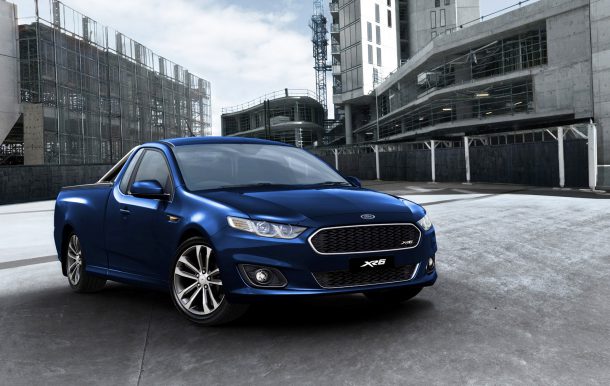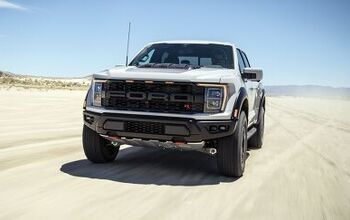Maybe the Dingo Ate Your Terminology: Australians Angered by the Term 'Truck'

Every country has its linguistic eccentricities. The Brits continue to call transport trucks “lorries” (and then there’s all that “boot” and “bonnet” stuff), while other locales adopt their own unique terminology for the same object or thing.
The first-generation Buick LaCrosse was sold as the Allure in Canada because “lacrosse” is Quebecois slang for something to which an entire Seinfeld episode is dedicated.
Australia is no different, but many people Down Under aren’t happy with a new term that is creeping into the country’s vernacular: “truck.”
According to the Aussie publication CarAdvice, the imminent demise of the country’s beloved “utes” — car-based pickups similar to the long-departed Chevrolet El Camino — is breeding a backlash to the proper terminology for their conventional replacements.
The land of dingoes and shrimp on the barbie spawned the car-based utility back in the 1930s, and they enjoyed a long run, even after the segment died out in North America. Last month, the Ford Falcon Ute ended a 55-year production run, and the Holden Ute’s looming death will seal the coffin.
Replacing them will be newfangled “pickup trucks,” such as the Ford Ranger and Holden Colorado (Chevrolet Colorado in the U.S.).
Rob Margeit, editorial production manager of CarAdvice, explains the reaction: “And this has, if you believe the multitude of social media channels that drive so much of today’s discourse, gotten up the collective noses like flies in a desert of a horde of patriotic and jingoistic Aussie car buyers.”
Of course, patriotism has clouded the conversation. Australia — where water swirls the opposite direction as it leaves the toilet bowl — already has a bevy of smaller pickups from the likes of Toyota, Mazda, Nissan, Mitsubishi and Izuzu.
Unlike the utes, these conventional vehicles have a cab and a utility bed, and are very clearly “pickups.” Utes were always a passenger car with the rear seating removed (and replaced with a bed). The two aren’t interchangeable, and “pickup” is the proper term, the publication writes.
“So it seems this latest disquiet is not so much about the loss of an Aussie icon itself, but rather the slipping from the lexicon of that most Australian of words, ute, in favour of yet another Americanism,” Margeit writes. His advice? Stop worrying, bogans.
Our advice is the same, only it also involves a case of Fosters and a ride on a kangaroo.
[Image: Ford Australia]

More by Steph Willems
Latest Car Reviews
Read moreLatest Product Reviews
Read moreRecent Comments
- GregLocock Car companies can only really sell cars that people who are new car buyers will pay a profitable price for. As it turns out fewer and fewer new car buyers want sedans. Large sedans can be nice to drive, certainly, but the number of new car buyers (the only ones that matter in this discussion) are prepared to sacrifice steering and handling for more obvious things like passenger and cargo space, or even some attempt at off roading. We know US new car buyers don't really care about handling because they fell for FWD in large cars.
- Slavuta Why is everybody sweating? Like sedans? - go buy one. Better - 2. Let CRV/RAV rust on the dealer lot. I have 3 sedans on the driveway. My neighbor - 2. Neighbors on each of our other side - 8 SUVs.
- Theflyersfan With sedans, especially, I wonder how many of those sales are to rental fleets. With the exception of the Civic and Accord, there are still rows of sedans mixed in with the RAV4s at every airport rental lot. I doubt the breakdown in sales is publicly published, so who knows... GM isn't out of the sedan business - Cadillac exists and I can't believe I'm typing this but they are actually decent - and I think they are making a huge mistake, especially if there's an extended oil price hike (cough...Iran...cough) and people want smaller and hybrids. But if one is only tied to the quarterly shareholder reports and not trends and the big picture, bad decisions like this get made.
- Wjtinfwb Not proud of what Stellantis is rolling out?
- Wjtinfwb Absolutely. But not incredibly high-tech, AWD, mega performance sedans with amazing styling and outrageous price tags. GM needs a new Impala and LeSabre. 6 passenger, comfortable, conservative, dead nuts reliable and inexpensive enough for a family guy making 70k a year or less to be able to afford. Ford should bring back the Fusion, modernized, maybe a bit bigger and give us that Hybrid option again. An updated Taurus, harkening back to the Gen 1 and updated version that easily hold 6, offer a huge trunk, elevated handling and ride and modest power that offers great fuel economy. Like the GM have a version that a working mom can afford. The last decade car makers have focused on building cars that American's want, but eliminated what they need. When a Ford Escape of Chevy Blazer can be optioned up to 50k, you've lost the plot.


































Comments
Join the conversation
In Britain (and, possibly, other commonwealth nations) a lorry is a subset of truck styles, what we here in the US would call a flat-bed truck. A permanently-enclosed truck body (Box Truck in US parlance) is known as a van.
I can"t resist a coupla comments. I say Koopay but you can't sing "Little deuce coupe" without the American pronunciation. On the tractor-trailer controversy, around here we always referred to the 'tractor' part as the prime mover. I own a Falcon one tonner with the tray back and have trouble deciding what to call it. (The owners manual says Falcon Ute)